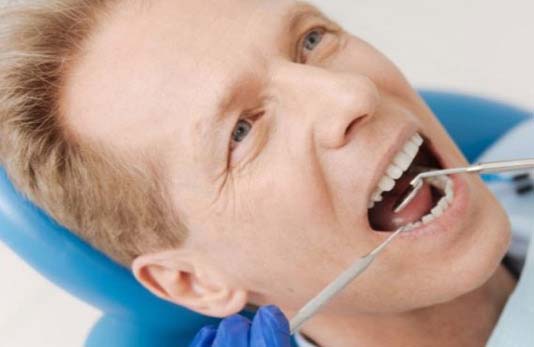The connection between AIDS and your oral health

If you're HIV-positive, dental health may not always be at the top of your mind. But chronic health conditions like HIV and AIDS can put you at elevated risk for certain oral health problems. There are some conditions that can happen to anyone, but others only appear in people with a compromised immune system. Here’s what you should look out for and how you can protect your smile along with your overall health.
Dry mouth and cavities
Some anti-HIV drugs, as well as HIV itself, may cause a decrease in saliva. Saliva can help to remove debris on your teeth and fight harmful bacteria, so having a dry mouth can increase your risk of developing tooth decay.
Fortunately, dry mouth is easy to treat. Make sure to drink plenty of water and use sugar-free gum or candy to stimulate saliva flow. If you have dry mouth after trying these methods, talk to your dentist about artificial saliva products.
Oral lesions
If you have HIV, you may find yourself with sores inside and around your mouth. This symptom may have different causes.
Raised white bumps inside the mouth can because by human papillomavirus, or HPV. These lesions, which can be smooth, rough or even cauliflower-shaped, can be prevented by practicing safe sex and reducing or eliminating your intake of alcohol and tobacco. HPV is linked to oral cancer, so talk to your dentist immediately if you notice any sores that match this description.
Canker sores are a different type of lesion. These sores, which appear as small bumps with red borders, aren’t dangerous but they can be painful. Your physician may prescribe a rinse or topical medication for canker sores that don’t go away on their own. You can also lower your chances of developing canker sores by using toothpastes that don't contain sodium lauryl sulfate.
Herpes blisters (also known as cold sores) are often mistaken for canker sores and are common among people with compromised immune systems. They can be especially large and painful and may appear inside the mouth or around the lips. They are treated with antiviral medication.
Thrush
Thrush (or oral candidiasis) is a fungal infection of the mouth. Thrush usually appears as white patches on the tongue or roof of the mouth, but it can also cause sores at the corners of the lips. Having a dry mouth can make thrush worse. This is commonly the first indicator of a compromised immune system, so let your physician know if you notice signs of thrush.
Gum disease
Being HIV-positive makes you more likely to develop a specific type of gum inflammation. The first stage of this inflammation is linear gingival erythema (LGE) and appears as a redness along your gum line. If not caught in time, LGE can develop into a more severe form of gum disease which eventually destroys the gum and bone tissue that supports your teeth.
If you have LGE, ask your dentist about an antimicrobial mouth rinse and maintain a regular dental hygiene routine. If you have severe gum disease, your dentist may recommend scaling and root planing or other gum treatments.
Hairy leukoplakia
Despite having a funny name, hairy leukoplakia is no laughing matter. This condition shows up as furry-looking white patches on the sides of the tongue and is a strong indicator of HIV. These patches are made up of keratin, the same protein as your hair, skin and nails. They don’t cause pain or discomfort and may be treated with anti-HIV drugs and regular brushing and flossing.
Last updated December 1, 2021
Related articles:
The oral health information on this website is intended for educational purposes only. Always consult a licensed dentist or other qualified health care professional for any questions concerning your oral health.


